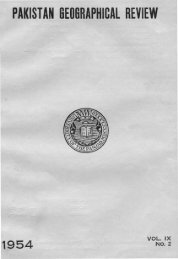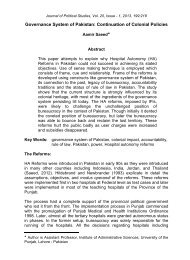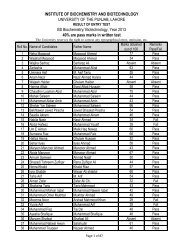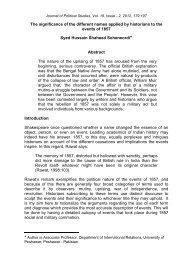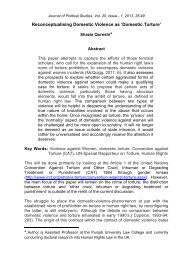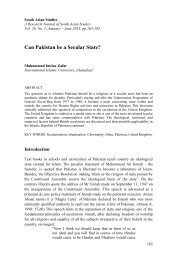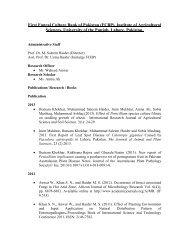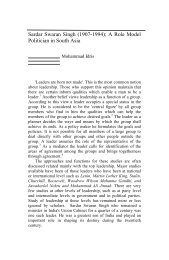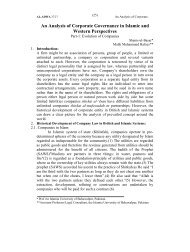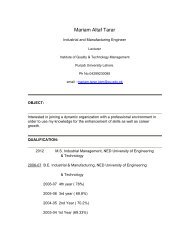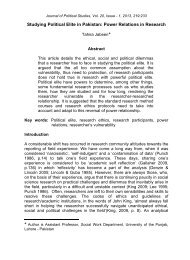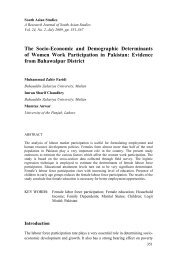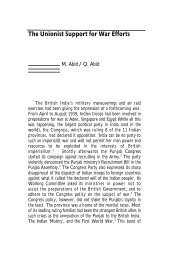Roots of authoritarianism in Pakistan-KU.pdf
Roots of authoritarianism in Pakistan-KU.pdf
Roots of authoritarianism in Pakistan-KU.pdf
You also want an ePaper? Increase the reach of your titles
YUMPU automatically turns print PDFs into web optimized ePapers that Google loves.
Authoritarianism <strong>in</strong> <strong>Pakistan</strong><br />
<strong>Pakistan</strong>, unleashed the divisive forces, that, more than India,<br />
threatened the survival <strong>of</strong> the young nation.” 10<br />
It is an undeniable fact <strong>of</strong> history that not more than 200 families<br />
have shared political power <strong>in</strong> <strong>Pakistan</strong> s<strong>in</strong>ce <strong>in</strong>dependence.<br />
These politicians have exploited the country <strong>in</strong> collaboration with<br />
the military. Lust for power has proved to be disastrous for<br />
<strong>Pakistan</strong>. “Masters <strong>of</strong> the new nation, the bureaucrats had little<br />
<strong>in</strong>terest <strong>in</strong> organis<strong>in</strong>g elections, and political developments<br />
follow<strong>in</strong>g J<strong>in</strong>nah’s death can only be described as chaotic. There<br />
were no fewer than seven prime m<strong>in</strong>isters <strong>in</strong> ten years. Liaquat<br />
Ali Khan (50 months <strong>in</strong> <strong>of</strong>fice) was assass<strong>in</strong>ated. His successors,<br />
Khwaja Nazimudd<strong>in</strong> (17 months); Mohammed Ali Bogra (29<br />
months); Chaudri Mohammed Ali (13 months); Shaheed<br />
Suhrwardy (13 months); I.I. Chundrigar (2 months); and Firoz<br />
Khan Noon (11 months), all became victims <strong>of</strong> palace<br />
<strong>in</strong>trigues…Throughout the 1950s two archetypal bureaucrats,<br />
Ghulam Mohammed and Iskander Mirza, brazenly abused their<br />
powers as head <strong>of</strong> state to make or break governments. In April<br />
1953, Ghulam Mohammed set an unfortunate precedent when,<br />
cit<strong>in</strong>g the government’s failure to resolve ‘the difficulties fac<strong>in</strong>g<br />
the country’, he dismissed Khwaja Nazimudd<strong>in</strong> and <strong>in</strong>stalled<br />
Bogra <strong>in</strong> his place. When Bogra responded by try<strong>in</strong>g to limit the<br />
governor general’s power, Ghulam Mohammed dismissed him<br />
too. And so it went on.” 11<br />
Power <strong>in</strong> <strong>Pakistan</strong> meant ‘no accountability’. It was a ticket to do<br />
as one pleased. Hence <strong>authoritarianism</strong> kept fester<strong>in</strong>g <strong>in</strong> the<br />
rul<strong>in</strong>g elite. “In contrast with the ‘Congress System’, the <strong>Pakistan</strong>i<br />
political process was chaotic immediately after <strong>in</strong>dependence,<br />
display<strong>in</strong>g a bewilder<strong>in</strong>g array <strong>of</strong> shift<strong>in</strong>g allegiances and<br />
10 Suleri, Z.A., <strong>Pakistan</strong>’s Lost Years (Lahore: Progressive Papers Ltd.)<br />
11 Jones, Owen Bennett, <strong>Pakistan</strong>: Eye <strong>of</strong> the Storm, (New Haven: Yale<br />
University Press), p. 230.<br />
5



